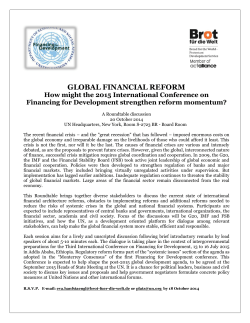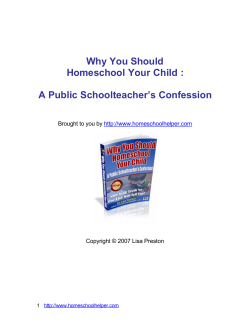
Document 183110
c THEFkEEMAN WC*- How to SeparateSchooland State: A Primer by Douglas A c c Dewey forceful case for eliminating the role of government in education has been stated in the previous article. This essay wig provide an introductory answer to the “how” question. Efforts to achieve separation of school and state can be divided into three categories, by order of importance: entrepreneurial, educational, and political. “Entrepreneurial” serves as a catchall for all forms of vohmtary action; that is, efforts that do not involve or require government action. It naturally includes the common use of “entrepreneurial,” as in a risk-taking, profit-seeking business venture. But it also refers to everything parents, churches, associations, and others can do todnywithout leave from the superintendent or governor-to liberate famities from servile and therapeutic dependency on government for the education of their children. Entrepreneurial efforts further the cause of the separation of school and state both in fact and by example. Every time a child is removed from a government school, bound either for private or home education, the ratio of free to dependent is improved, and the process of manumission and self-responsibility provides a stirring and fortifying witness for other families and the public at large. Education about education is crucial. We are repeatedly told that the world is entering the ‘knowledge age.” If this is so, then the cause of separation is cinched. Once people learn-even a little-about the true origins attd purpose of compulsory government schooling, their faith in it evaporates. Some people’s faith is more stubborn than others, and they will ultimately be persuaded only by the success of entrepreneurs. Political action of every type is happily the least achievable and least important front in the war for educational independence. With a few notable exceptions, most political efforts are as fraught with danger as they are di&ult to achieve. 1. Entrepreneurial Efforts Edu-Tech Educational futurist Lewis J. Perelman likes to ask audiences to identify one of the pioneers of the unschooled, ungoverned learning industry (coming to a fiber loop near you). The man’s name is Tii BemersLee, and no one knows who he is, even though he invented the World Wide Web. Mr. Dewey is president of the National Schd- Mr. Perelman’s point is that the big news orship Center. in Washington.D.C., o research and iqformntion clearinghouse on privately in education is already happening and is funded voucherprograms. The viewsexpressed neither waiting for nor dependent on hype here are his own. from People magazine or 60 Minutes. That 480 c c c is fairly typical in the history of innovation, says Perelmaa: the leading edge is already the trailing edge by the time most people know of it. Right now, there are things happening of which nobody is aware that will hugely affect the way Americans teach and learn. The vital role that technology wiIl play in cracking open the nearly $300 billion K-12 education market today is only dimly perceived. The most obvious impact is in the area of home education. Increasingly powerful and affordable learning tools give parents the confidence to try their ovvn hand as educators of their own children. At Bob Jones University in Greenville, South Carolina, televisions and computers combine with satellites to allow teaching and learning to conquer time and space forever. LINC (Live Interactive Network Classroom) can broadcast live expert instruction into homes and buildings located literally anywhere on the globe. A student in Alaska can ask a question, have it be heard by students in New York, Kansas, and Oregon, and answered by the teacher in Viinia. Those who wattt to set their own schedules can download courses on their VCR and use them at their own convenience. Cohmmist Cal Thomas notes that this kind of technology has enormous potential to help liberate both middle-class and poor families “from their bondage to government schools.” For children whose homes cannot afford satellite dishes, their churches aad boys’ clubs can acquire them for use in small groups. New Sct~ools New technology also brings topnotch htstruction and subjects such as foreign languages and advanced math and science within reach of small, fledgling, or strugglmg private schools. And fledgling schools are what we must see much more of-especially from religious conservatives, whose disgust and frustration with arrogant government educrats has already brought them to the brink of mass exodus. They need nudging. Why do Christian parents send their chil- dren to government schools that noisily promise to undermine everything they hold dear? One reason is historical and will wear off over time: Protestants in their mid4s and above still fondly remember when their collective denomination had some clout in the government schools, and they dream of regaining it. Never mind that this clout was integral to the establishment of compulsory government schooling in the first place and came at the expense of Catholics. Now the Protestants have lost control to the secularists, and don’t like it one bit. But parents in their 20s and 30s have no memories of the Ten Commandments on the classroom wall, and will be less prone to the vain and sentimental hope of re-Christianizing government-owned schools; these parents are more likely to home school or build schools. They are the future. A second, and more formidable stumbling block for many conservative protestants is their evangelical commitment to be “salt and lit” within the secular government schools. Christ certainly enjoins his followers to he “fishers of men”-a daunting task raquiriag courage, humility, and prudence. He does not necessarily ask us to use minnows to bait b-udas. Rather than being satisfied with piecemeal progress within the government system, Christians can build more of their own fully successful schools, and win converts by providing attractive examples of godly education. A clean, cheerful school hlled with 200 well-behaved, intelligent children can preserve, enhance, and enlighten the whole community. More salt and light, perhaps, than scattering those 200 children across the rocky ground and shallow soil of govemment schools. The Poor When all else fails, government school apologists point to the inability and unwillingness of “poor people,” especially those in the “inner cities,” to see to their children’s education. It is an appalling hypocrisy for govemmentalists who have used every available means to rip and bum the social fabric of black, urban, and low- 482 THE FBEEMAN c c c l JULY 1996 income Americans to point to their Own handiwork as proof of their indispensabiity. It is true that family and civic life in cities and among the poor is in tatters. The main cause is the stripping away of family responsibilities from families by govemmenteducation chief among them. Restore that one thing and the rebuilding can begin. Precollege scholarships (a.k.a. privately funded vouchers) can be a bii help here. In 1991 J. Patrick Rooney, chairman of the Golden Rule Insurance Co. in Indianapolis, committed $1.2 million of his own money to help low-income families pay for tuition at the school of their choice. Mr. Rooney called the scholarships a “hand up, not a hand out” and backed that up with a requirement that participating families pay half the cost. Five years later, Pat Rooney’s tough-love philanthropic vision has spawned a movement that helps some 10,000 low-income children in 25 towns across America. Another half-dozen precollege scholarship programs are in the planning stages, and interest continues to build. The goal of fostering independence from government is completely fulfilled in miniature by precollege scholarships. Citizens in a given community help the needy among them to attend the schools of their choice. Scholarships liberate families one at a time, without coercion. They are flexible, replicable, efficient, and empowering. They enjoy broad bipartisan support, and, if marketed effectively, could grow into the same kind of tradition of giving enjoyed by the United Negro College Fund, the Red Cross, and the Salvation Army. America has a loug tradition of providing help for needy families to attend college. We simply need to extend that great tradition to help children earlier, when it costs less and is needed most. Edu-Movers Then there are the entrepreneurs in the traditional sense. In a recent Forbes ASAP article, George Gilder asked MichaeI Milken what he thought about the potential for opening up the $300 billion K-12 education industry, and Milken instantly corrected Gilder, saying that it is a $2 trillion industry, because it’s worldwide. People like Michael Milken and Bill Gates become billionaires not so much because they think bigger, but longer. They have what could be called an entrepreneurial imagination, unconstrained by the way things look, and the way people think, wherever they happen to be stuck in time. Michael Milken is still behaving penitently for now (he needn’t), but he has founded a corporation called EEN (Electronic Education Networks), which he hopes to ultimately build into a multibilliondollar corporation. He won’t lack for investors, either. Wall Street is not nearly so fettered by turfy political ideologies as Washington, and bii investors will not fret over the tousled sensibilities of government school union bosses once they are convinced there is real money to be made. When government schools are perceived merely as vehicles for brownie points with liberal journalists, sycophancy is painless and even profitable for corporate America. But as public cot& dence in government schooling continues its inexorable collapse, and the whiff of billions begins stirring in the air, the savvy investor will focus his attention on the greatest emerging market in decades and treat government schools as just another competitor to blow out of the water. And that rusted 01’ educational Titanic is listing badly. In February 1996, Lehman Brothers held its first ever Educational ,Industry Investment Conference in New York. Conferees were regaled with new opportunities in a $680 billion industry, including preschool, K-12, postsecondary, and training and development. Conference organizer Michael Moe, now with Montgomery Securities in San Francisco, compares the potential education market to the health-care industry of 25 years ago. ‘The mentality used to be that this was the province of government, just lie it is now with education. But that’s changing,” says Moe. John M. McLaughlin edits the Education Industry Report from St. Cloud, Minnesota, which is published by EduVentures of Boston. McLaughlin has begun rating HOW TO SEPARATE SCHOOL AND STATE: A PRIMER c 25 publicly traded education-related companies and maintains an Education Industry Index (EII), which in 1995 rose 65 percent. As the EII continues to rise, watch for sudden, precipitous increases via Michael Milken (or Warren Butfett, or Bill Gates, or AT&T, or IBM, or . . .). A single educational FedEx will change everything. Another worthy effort involves setting up rival teachers associations to the NEA and AFT. The Association of Christian Educators already has 5,000 members. The Association of Educators in Private Practice started in 1991 with 16 members; it now has 500 member+threequarters of whom are self-employed “freelance” teachers-in other words, doing it (heavens!) for profit. Rival accreditation and credentialing groups are an outstanding idea-any nongovernment authority in education threatens the monopoly and should be welcomed. 2. Educational Efforts c c Everything entrepreneurial is by nature educational-teaching separation of school and state by example. But we speak of efforts whose primary purpose is educational, in the sense of offering ideas to the public. Winning with Words It is no mere pedantry to insist upon the immense power of words. He who names the words makes the rules, controls the game, and determines the outcome, simply because rules are made up of words, and the terms of victory and defeat are described and settled with words. No rational thought, nor communication of thought, is possible without them. Allowing your opponent a wording advantage is rather like permitting bim to be permanent prosecutor, with you the permanent occupant ofthe witness stand “Isn’t it true that private education is elitist, racist, and undemocratic, and its apologists always reflexively deny this charge?” “WeU actually-” “Just answer the question with a yes or a no.” 483 “Umm, no.” “I rest my case.” For 150 years we’ve been losing the school war through the word war! There are scores of real-life examples of how the government schooling monopoly uses language to its own advantage. For instance, you never hear it refer to itself as a compulsory government-monopoly. More typical is the friendly and familiar invitation to support “our neighborhood public schools.” Nongovemment schools must take their pick from parochial (selfish and narrow), private (elitist, exclusive), and independent (individualistic, superior). Government schools are public the way jails and departments of motor vehicles are public, not the way parks, libraries, or hardware stores are public. Try living in southeast Washington, D.C., and sending your child to the “public” school a few miles away in McLean, Virginia! This one example has the makings of a significant rhetorical (hence, educational) victory for educational freedom. Never say “public,” always say “government”-government school, government program, government teacher. It’s not an insult; it’s merely accurate. If someone finds it offensive, ask him ifhe’s got something against the government doing those things. One more important example of the power of words, is one that pertains directty to the heart of what separation of school and state is really about. It’s the matter of reform vs. repeat. The work of liberating families from educational serfdom has nothing to do with reform and everything to do with repeal. In the late 1980s Mikhail Gorbachev had some famously irrelevant ideas about “reforming” Communism. The problem Gorbachev encountered was that the only people interested in perestroika and gtusnosr were aging fellow travelers at American universities and magaxines who desperately hoped he would succeed in preserving the Soviet regime. It must not be that way with us. The fundamental lesson of peresrroikn is not so much that it failed, but that it was the pursuit 484 THE FREEMAN c c c l JULY 1996 of a hollow and unattainable goal and deserved the failure to which it was doomed. As an institution, government monopoly schooling, like Communism, has no human face. It is by definition coercive, corrosive, and usurpative. Our goal is not a sensitive and flexible tyranny, but an arrangement for learning that is entirely voluntary, with full authority restored to families, which in turn educate their children not in servility and fear, but in honorable obedience to duty and love. As a practical matter, this means the words “improve” and “government schooling” must stop appearing in the same sentence. Similarly, we should not think of ourselves as education reformers. Let Catholics reform Catholic schools if they need reforming; let Montessori schools improve themselves, or not, according to the requirements of their pedagogy and the preferences of their clients. Notice there is no such thing as computer reform, motorcycle reform, or gardening reform. When gardeners figure out it’s better to mulch in the fall, that’s when they’ll do it-if they want. A rule of thumb is that if something can be reformed, it’s probably controlled by the government. A business may retool, restructure, and even revamp, but it only reforms when so commended by government. The whole notion of education reform should be rethought-d rejected. Building Confidence The first intellectual victory on the hotizon is eliminating the prevailing mythology that pregovemment-schooled America was preliterate America. It is bard to overemphasize the importance of broad public education on that matter. Most people assume that government schools were begun to correct a problem of crippling illiteracy. Yet there is a wealth of facts showing the depth and breadth of America’s remarkable and unprecedented literacy from colonial times through the mid-nineteenth century. Such inconvenient facts and many others like them need to start making the rounds of American public life. There is a critical need for more popular and scholarly books about how America~got government schooling, where it was designed, how it was adopted, and who were the prime movers and beneficiaries. Even as we uncover the troth about how successful American education was before the states took it over, we need to paint a vivid and exciting picture of what it will look like when we regain tbe freedom we once had-a vision of educational opportunity and excellence. When education is in the hands of families, churches, and businesses the excellence, variety, and affordability will come from market-driven enterprises. 3. Political Efforts Here it might be helpful to quote Irving Kristol’s first law of educational reform: Any reform that is acceptable to the educational establishment, and that can gain a majority in a legislature, federal or state, is bound to be worse than nothing. It’s that second part that most impresses. In addition to the prodiious political clout of the teachers unions, recall that 88 percent of American families still depend on government for their children’s education. That means that as long as legislatures even remotely represent the perceived interests of their constituencies, no “reform” will win passagethat is not acceptable to the educational establishment. The deeper truth that Mr. Kristol may not have intended, is that the “worse than nothing” rule includes legislation that could pass in any legislature even against the expressed wishes of the unions. The reason is that the unions are not the tme establishment, but merely its bellicose representative in the political arena. We are the establishment. There is no point soft-pedaling the deeper truth that most American families have abnegated the sacred duty they owe their children by relinquishing the obligation to pay for and provide their education. If government had taken over the family’s duty to feed their children, and zoned kids into neighborhood feeding stations for all their meals, we wouldn’t argue that families had in fact retained the duty to feed their HOW TO SEPARATE SCHOOL AND STATE: A PRIMER c. C’ c children, by pointing out that they still paid their taxes. By this logic, there ere no family nghts and responsibilities, and there is nothing the government should not undertake in their behalf. It would be more pleasant to paper over the acquiescence of American families in the face of persistent and egregious government intrusion as the “no choice reaction.” But just as with the first war for American independence, the struggle to regain the rights and burdens of self-governance will be achieved tbrougb sac&ice end strife, not happy talk. We must say: “Yes, American families are weak. Yes, my family is weak, but I won’t let it stay that way!” This hard truth presents the greatest cballenge and most promising opportunity for separation. For millions to exit the system, only thousands have to show them the way-and thousands already are doing so. In March 1996, the WaN Street Jourtzaf ran a front-page story about the fligbt of suburban middle-class families from government schools to private and Catholic schools. The Boston area experiences a 6 to 8 percent . m . pnvate . _school enrollments each mcrease year; m Florida it rose by 20 percent in three years. Nongovemment enrollment is booming throughout the country, most tellingly at the expense of the supposedly “good suburban schools.” Homeschoolhtg continues to expand and draw from increasingly diverse population groups. Not long ago, Better Homes and Gardens did a feature on it. In a few short years homeschooling has shifted from a “fringe” idea to a respectable educational choice. What has all this to do with politics? Nothing-which is the main point about how important political action is at this stage of the campaign: it isn’t. According to Sun Tzu, it is always better to avoid a pitched battle if victory can be achieved by other means. The visible opponents (unions and the politicians they control) are powerful, entrenched, wealthy, experienced, and unscrupulous. Separationists are weak, dispersed, without resources, inexperienced, and generally limited in scope of action by strongly held principles. Our strength is our 485 message, which gets drowned in the welter of political persiflage. In the calm of the written word, the careful debate, we win every time. Besides, most education-related political action is either useless (and a waste of precious resources) or fraugbt with danger. Many political efforts that conservatives consider bold are no more than revenue schemes, such as expanding government throughvouchers or tax&edits. Proponents of those ideas are either oblivious or indifferent to the deeper premise of govemmentfunded schoolin~that it robs families of the ownership (hence stewardship) of their children’s educatio-d their obliviousness constitutes a de facto embrace. To be sure, there are some political actions worth pursuing, including tax relief at every level, repealing compulsory attendance laws, and eliminating the federal role in education. For each political action, the following three-part test should be applied: 1. Does the action in any way concede the authority or prior claim of the state in the realm of education? 2. When it comes to independent and religious schools, does the action heed the Hippocratic dictum to first, do no harm? 3. Does the action do a deliberate wrong, no matter how slight, to achieve a good, no matter how great? Conclusion As promised, this is only an introductory answer to what must be considered the biggest public-policy question of the century. It speaks directly to the prospects of continued self-reliance and limited govemment. Only if we can restore the fundamental sovereignty of families in the education of their chitdren can we begin once again to speak of “the family” as having political and morel standing in public lie. If families remain weak and servile, no other liberties will long endure. With families restored to full diity and vitality, all else can be restored. q
© Copyright 2025





















